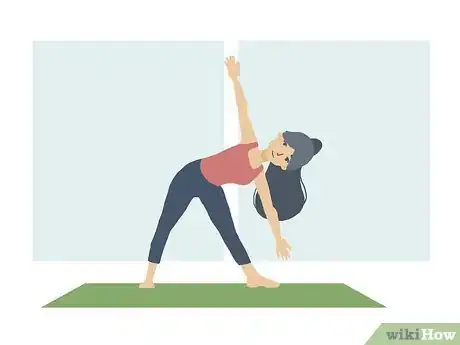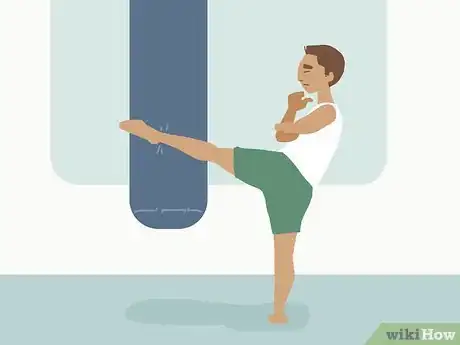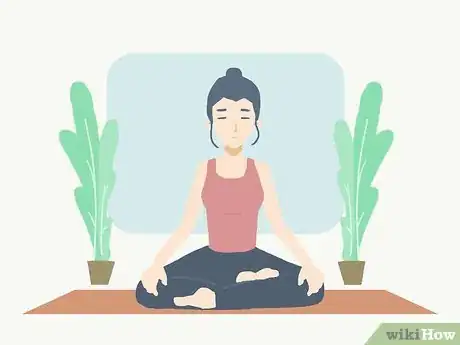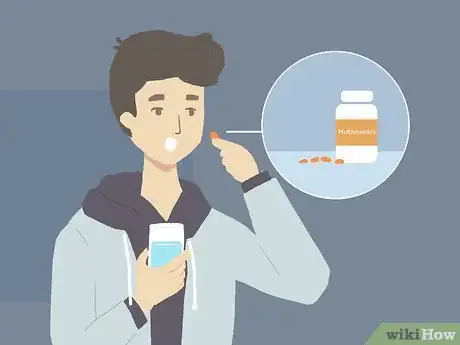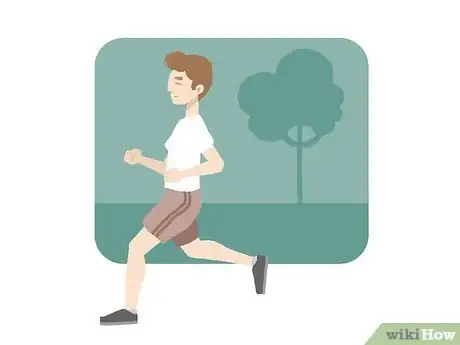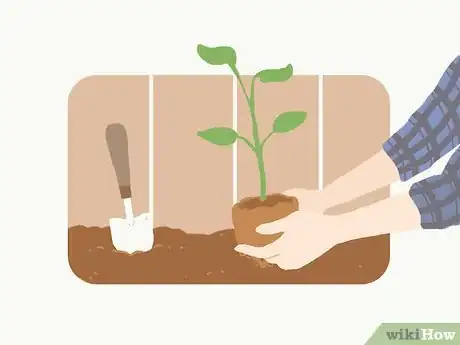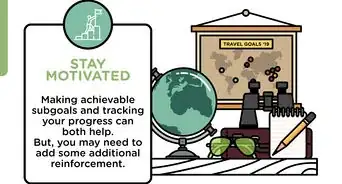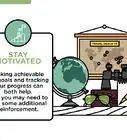This article was co-authored by Annie Lin, MBA. Annie Lin is the founder of New York Life Coaching, a life and career coaching service based in Manhattan. Her holistic approach, combining elements from both Eastern and Western wisdom traditions, has made her a highly sought-after personal coach. Annie’s work has been featured in Elle Magazine, NBC News, New York Magazine, and BBC World News. She holds an MBA degree from Oxford Brookes University. Annie is also the founder of the New York Life Coaching Institute which offers a comprehensive life coach certification program. Learn more: https://newyorklifecoaching.com
There are 17 references cited in this article, which can be found at the bottom of the page.
wikiHow marks an article as reader-approved once it receives enough positive feedback. This article has 23 testimonials from our readers, earning it our reader-approved status.
This article has been viewed 1,180,723 times.
Enjoying life is often thought to be a mindset, the result of reflection, action, and gratitude. And while most of us lack sufficient free time to escape to some mountaintop temple to follow our bliss, the best way to find happiness is to make practical, everyday changes. Coupled with conscious choices to appreciate the people in your life and making space to do the things you're best at, small changes to your life soon add up to greater enjoyment in life.
Steps
Cultivating Emotional Well-Being
-
1Get a pet (optional). Owning a pet provides love, companionship, and hours of entertainment. Pet ownership has health benefits, too, such as reducing your blood pressure and the risk of heart disease, increasing your feelings of well-being and connectedness, and teaching you lessons in empathy and nurturing.[1]
- For extra warm and fuzzy feelings, consider rescuing a pet from your local shelter.
- However, only get a pet if you know you can take care of it knowledgeably. Don't just keep an animal for your own benefit.
-
2Develop an interest in music. Listening to music taps into your brain’s imagination and sense of self-identity, boosts your self-esteem, and lessens feelings of isolation.[2] Listening to music feels empowering. Put on your favorite album – or that one you keep meaning to dive into, turn up the volume, and cut out all other distractions so that you can really experience the wonders of the music.
- In some cases, music has been shown to help people coping with dementia, giving them a greater sense of empowerment. Music therapy is also useful in people suffering from anxiety and depression.[3]
Advertisement -
3Start the day with a smile. Your facial expression is traditionally thought of as a window into how you feel, but it's also thought that your facial expression can influence your mood.[4] Therefore, be sure to smile freely, to ensure that your mood is upbeat. You might even want to greet yourself in the mirror with a smile first thing in the morning––that happy face may be just enough to keep that mood flowing all day long.
-
4Take a break. A decent break doesn’t mean zoning out to the TV or going down the internet rabbit hole. It means setting some time aside and making it special. As a thank-you to yourself, give yourself a vacation or “staycation”, a change of scenery – even if it just means having a picnic in your backyard or building a fort with your kids in the living room. Taking a break that is different from the ordinary and lets you "hang loose" can do wonders for your sense of fun, escape, and fulfillment.
-
5Spend time with interesting people. It is well known that people with a wide circle of friends tend to live longer.[5] Of course, birds of a feather flock together, and it’s also been shown that your friends’ behavior can actually have a big impact on yours. Make sure you hang around with positive, interesting people to inspire yourself to live a richer life.
- Are you putting off getting in touch with an old friend? Make that call today! If you can’t reach the person by phone, set some time aside to write a long email, or go old-school and pen a letter.
- Do you feel like you are being dragged down by an unhealthy friendship? Enabling your friend’s bad behavior doesn’t do either of you any good. Do some soul-searching and decide whether to resolve things with a heart-to-heart or to simply end the relationship.
- Are you having trouble meeting new people? Get outside your comfort zone by going to new places, striking up conversations with strangers, taking on a new hobby, or even joining a social activity group on something like Meetup.com.
Nurturing Mental Well-Being
-
1Reduce stress. You don’t need a clinician to tell you that stress is no fun, but did you know that even a mild stress-induced mood disorder like sub-clinical depression can wreak havoc on your immune system? In fact, the duration of a stressful period has more effect on immunity than its severity.[6] To fight stress, first recognize it and stop trying to battle it alone. Find ways to ground yourself and to let off steam constructively. Sports, exercise, a hobby, and spending time with friends are all good ways to counteract stress. You might like to try guided imagery, yoga, or tai-chi; if you have a severe mood disorder, seek counseling and/or medication.[7]
-
2Improve your stress management, if you cannot remove the stress. Can you change the cause of the stress? Then, do so. In many cases though, stress links back to your job, money, or family. In uncertain times, changing jobs can be difficult, in which case, you must find ways to manage it better.
- Managing stress that comes from work or family can be done by being more assertive about your needs and setting boundaries. Assertion and boundary-setting include learning to say "no" to tasks that overload your schedule, getting regular "me" time, and avoiding taking work calls when you are relaxing at home with family or friends, or vice versa.[8]
- Other ways to manage work-related stress consist of working smarter not harder, which means breaking down larger tasks into smaller increments and delegating tasks to others, if necessary. Also, make sure to use workplace resources like trainings and professional development events to counteract detrimental practices that may impact your health and well-being.[9]
-
3Learn new things. Getting a higher education can bolster your self-esteem and interest in the world. But it's not for everyone and it's not the only solution. Reading, traveling, taking fun classes, attending guest lectures, and meeting people from other cultures will do the same thing. Or try MOOCs––massive online open courses––these courses offer very stimulating ways of stretching your knowledge and abilities, in your own time. Ultimately, instead of running from new experiences, engage in them, and seek more whenever you can. After all, you only live once.
-
4Find a hobby. Whether you choose stamp collecting or kickboxing, hobbies and extracurricular activities are necessary for the pursuit to enjoy life. Hard routines are counterproductive to spontaneity and surprise––leave a little flexibility in your schedule so that it doesn't become routine and humdrum. Do your hobby or activity because you love it and because it gets you "into the flow", and not for reasons such as keeping up with other people or conforming to unrealistic social standards.
- Research demonstrates that participating in leisure activities can have a positive impact on your physical and mental health and wellness. Benefits of hobbies include lower blood pressure, less cortisol, lower body mass index and greater perception of physical abilities.[10]
-
5Read a good book. Putting your feet up and watching your favorite show at the end of the day is definitely a treat, but since passively watching a story doesn’t do much to stimulate your imagination, it can also leave you feeling restless and 'zombified'. For a change of pace, find a book that you can lose yourself in for a while. If you don’t consider yourself much of a reader, think outside the box and find something that relates to your hobbies: if you’re a baseball fan, pick up Bill Veeck’s autobiography; if you’re a biker, try Zen and the Art of Motorcycle Maintenance.
- Keep notes of passages or ideas that really resonate with you. If you keep a notebook in your usual reading spot, ready to jot down such inspirations, you'll soon amass an inspirational collection of ideas that matter to you and may help direct your sense of purpose for years to come.
-
6Practice meditation. Meditation reduces stress and promotes a calm feeling. Participating in a few minutes of meditation daily can promote a positive outlook and keep you feeling balanced and relaxed. It is important to maintain a good body posture and perform meditation in a distraction-free zone.EXPERT TIPAnnie Lin is the founder of New York Life Coaching, a life and career coaching service based in Manhattan. Her holistic approach, combining elements from both Eastern and Western wisdom traditions, has made her a highly sought-after personal coach. Annie’s work has been featured in Elle Magazine, NBC News, New York Magazine, and BBC World News. She holds an MBA degree from Oxford Brookes University. Annie is also the founder of the New York Life Coaching Institute which offers a comprehensive life coach certification program. Learn more: https://newyorklifecoaching.comLife & Career Coach

 Annie Lin, MBA
Annie Lin, MBA
Life & Career CoachOur Expert Agrees: Meditation helps you learn to create some distance between your emotions and yourself as the 'observer.' Emotions are energies that move through your body, just like clouds that move across the sky, but you can learn to just be the space in which those emotions happen, like the sky is there for the clouds.
Enhancing Physical Well-Being
-
1Strengthen your immune system. Nobody feels happy when they’re sick! Even doing something as simple as taking a multivitamin with vitamins C, E, and A, selenium, and beta-carotene might help to boost your immunity.[11]
- Having a strong immune system allows you to respond better to stress or physical illness. Other strategies such as regular exercise, getting adequate rest, and maintaining a healthy diet are also important for boosting immunity.
-
2Exercise. Exercising affects the release of endorphins, which transmit messages to the brain, translating into positive feelings.[12] Regular exercise not only combats depression, anxiety, and feelings of loneliness, but also strengthens your immune system. Even walking for exercise can increase your antibody and T-killer cell response.[13]
-
3Sleep well. Sleep is strongly linked to a person’s health, stress levels, weight, and quality of life. Moreover, while you sleep, your body produces cells that fight infection, inflammation, and stress, which means that getting too little sleep makes you more prone to getting sick and increases the time you need to recover from illness.[14]
- Exercising is one of the absolute best ways to sleep better at night.[15]
-
4Play in the dirt. Scientists are finding that friendly bacteria in the soil actually trigger the brain to produce serotonin (much like how antidepressants work).[16] If you have a garden, get out there and dig. If you don’t, consider starting one – if not for flowers, for vegetables and herbs that you can use in making healthy recipes. Even designing a container garden can create a spot of sunshine in your life.
- Obviously, not-so-friendly bacteria are also in your garden. Wear gloves to protect your hands, especially if you have cats or if neighboring cats use your garden as a toilet. And wash your hands well after playing in dirt!
-
5Eat healthy. It’s a no-brainer that eating well (fresh, unprocessed, real foods) has a huge variety of health benefits. In addition, taking the time to cook fresh foods for yourself gives you an emotional boost: it smells good, it looks good, it tastes good, and, when you become proficient at cooking, it can even provide a fun, creative break from your routine. In addition to being a form of self-pampering, cooking is also good for your wallet. If you’re new to it, start with a few fast, foolproof recipes that won’t turn you off cooking forever. The less processed foods in your diet, the healthier you'll be, which in turn will ensure a good deal more happiness for you.[17]
Expert Q&A
Did you know you can get expert answers for this article?
Unlock expert answers by supporting wikiHow
-
QuestionHow can I enjoy my life?
 Annie Lin, MBAAnnie Lin is the founder of New York Life Coaching, a life and career coaching service based in Manhattan. Her holistic approach, combining elements from both Eastern and Western wisdom traditions, has made her a highly sought-after personal coach. Annie’s work has been featured in Elle Magazine, NBC News, New York Magazine, and BBC World News. She holds an MBA degree from Oxford Brookes University. Annie is also the founder of the New York Life Coaching Institute which offers a comprehensive life coach certification program. Learn more: https://newyorklifecoaching.com
Annie Lin, MBAAnnie Lin is the founder of New York Life Coaching, a life and career coaching service based in Manhattan. Her holistic approach, combining elements from both Eastern and Western wisdom traditions, has made her a highly sought-after personal coach. Annie’s work has been featured in Elle Magazine, NBC News, New York Magazine, and BBC World News. She holds an MBA degree from Oxford Brookes University. Annie is also the founder of the New York Life Coaching Institute which offers a comprehensive life coach certification program. Learn more: https://newyorklifecoaching.com
Life & Career Coach
Warnings
- If you feel that life is suffering to the point of wishing to end it, PLEASE tell someone and seek help IMMEDIATELY. You deserve life, and you deserve to feel happy, safe, and loved. If you simply need to vent to someone about these emotions, call the National Suicide Prevention Lifeline in your country or text CONNECT to 741741 if you're in the United States. It's especially helpful if talking on the phone gives you anxiety. However, if your thoughts are active (having a set plan, having access to the materials), please call 911 or the emergency service number in your country IMMEDIATELY. No one deserves to feel like their life isn't worth living.⧼thumbs_response⧽
- Some of the negativity may be caused by things like depression or anxiety. If this is true of you, please seek help. Regular therapy and prescribed medication, as well as self-care and self-love, can do wonders.⧼thumbs_response⧽
- There is no "one-size-fits-all" solution to happiness. By all means, read what the self-help gurus and articles such as this suggest you try. But don't take it as gospel – if a suggestion doesn't work for you, then don't beat yourself up over it. Find an alternative that does work and stick with it instead.⧼thumbs_response⧽
References
- ↑ Phys.org on pets, health, happiness, and healing, http://phys.org/news162660892.html
- ↑ Journals.Cambridge.org: The contribution of music to quality of life in older people, http://journals.cambridge.org/action/displayAbstract;jsessionid=C00A60705AC2F7CACF21B1F4E1A84B3B.journals?fromPage=online&aid=283212
- ↑ Journals.Cambridge.org: Music and the well-being of people with dementia, http://journals.cambridge.org/action/displayFulltext?type=1&fid=570884&jid=ASO&volumeId=27&issueId=01&aid=570880
- ↑ NCBI.NLM.NIH.gov on facial feedback hypothesis, http://www.ncbi.nlm.nih.gov/pubmed/3379579?dopt=Abstract - Under the theory of “facial feedback hypothesis,” it has been shown that a person can alter his or her mood by sustaining a particular expression.
- ↑ NYTimes on friendship and lifespan, http://www.nytimes.com/2009/04/21/health/21well.html?_r=1
- ↑ APA on stress and immunity, http://www.apa.org/research/action/immune.aspx
- ↑ ClevelandClinic.org on diet, stress, exercise, and the immune system, http://my.clevelandclinic.org/disorders/chronic_fatigue_syndrome/hic_diet_exercise_stress_and_the_immune_system.aspx
- ↑ http://www.cmhc.utexas.edu/clearinghouse/files/TI043.pdf
- ↑ http://www.inc.com/jeff-haden/5-scientifically-proven-ways-to-work-smarter-not-harder-tues.html
- ↑ http://www.ncbi.nlm.nih.gov/pmc/articles/PMC2863117/
- ↑ MyClevelandClinic.org on diet, stress, exercise, and immunity, http://my.clevelandclinic.org/disorders/chronic_fatigue_syndrome/hic_diet_exercise_stress_and_the_immune_system.aspx
- ↑ BrynMawr.edu on the effects of exercise on the brain, http://serendip.brynmawr.edu/bb/neuro/neuro05/web2/mmcgovern.html
- ↑ ClevelandClinic.org on diet, stress, exercise, and the immune system, http://my.clevelandclinic.org/disorders/chronic_fatigue_syndrome/hic_diet_exercise_stress_and_the_immune_system.aspx
- ↑ Mayo Clinic on sleep deprivation, http://www.mayoclinic.com/health/lack-of-sleep/AN02065
- ↑ PubMed.gov: Effects of Exercise on Sleep, http://www.ncbi.nlm.nih.gov/pubmed/15892929
- ↑ MedicalNewsToday.com: Soil Bacteria Work In Similar Way To Antidepressants, http://www.medicalnewstoday.com/articles/66840.php
- ↑ https://www.nhlbi.nih.gov/health/educational/lose_wt/eat/calories.htm
About This Article
To enjoy life, try to set aside some time each day to do things that reduce stress, like exercise, yoga, and spending time with friends. Also, find things you enjoy doing and spend more time doing them, whether it's reading, playing with your pets, or learning a new instrument. You should also try to eat healthy, exercise, and get plenty of sleep so you feel like your best self every day. If you feel like work or an unhealthy friendship is making it hard to enjoy your life, make the decision to resolve things or move on to something new. To learn how to improve your stress management, keep reading!





